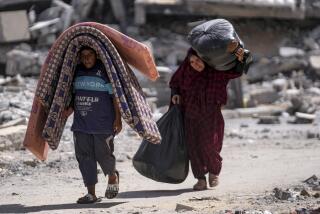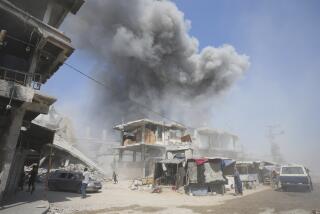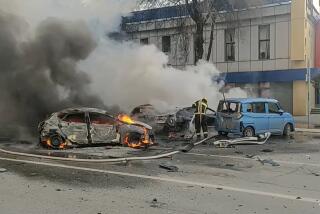U.N. Officials Outraged Over Serb Shelling of Civilians : Balkans: Death toll in Srebrenica nears 60. Convoys evacuate almost 1,000 refugees.
- Share via
ZAGREB, Croatia — U.N. officials expressed outrage Tuesday over the carnage left in the town of Srebrenica after Serbian rebels rained artillery shells on trapped civilians in one of the most shocking attacks in Bosnia-Herzegovina’s year-old war.
Amid Srebrenica’s privation and disease, the death toll from the bombardment rose to nearly 60.
However, Tuesday was relatively peaceful in the town and U.N. aid trucks that reached the scene were able to take nearly 1,000 refugees and frightened residents across the front lines to the city of Tuzla. It was the latest in a series of humanitarian evacuations aimed at removing at least 15,000 people from a town that many fear is doomed to fall to Serbian forces.
The Office of the U.N. High Commissioner for Refugees also announced that it will resume an airlift of supplies into Sarajevo on Thursday to ease a severe food shortage throughout Bosnia. Aid flights into the Bosnian capital had been suspended Saturday out of fear that Western aircraft might be fired on in retaliation for the decision by the North Atlantic Treaty Organization to begin enforcing a “no-fly” zone over the war-torn republic.
U.S. and other Western military planes policed the airspace over Bosnia for a second day. No violators of the flight ban have been reported.
Monday’s shelling of Srebrenica shook aid agency representatives and senior officers of the peacekeeping mission headquartered here out of their usually cautious statements; they accused the Bosnian Serbs of callous slaughter.
“This kind of attack can never be justified, whatever the provocation. It is an atrocity,” declared Cedric Thornberry, deputy chief of the U.N. Protection Force that now has nearly 30,000 troops and observers scattered across the former Yugoslav republics.
A shaken Larry Hollingworth, Sarajevo chief of operations for the U.N. refugee agency, told journalists in the Bosnian capital that he hoped the warlord who ordered the shelling of Srebrenica “burns in the hottest corner of hell.”
And Swedish Gen. Lars-Erik Wahlgren, commander of U.N. forces in the former Yugoslav federation, fired off a protest to Serbian authorities in Belgrade and the Bosnian rebel camp in Pale, demanding that a contingent of U.N. troops and observers be allowed in to eastern Bosnia to deter future attacks and help with frequently thwarted relief efforts for the tens of thousands of Muslim refugees trapped by the siege.
In London, former British Prime Minister Margaret Thatcher angrily accused Western nations of being “like an accomplice to massacre” in Bosnia and called for military pressure on the Serbs.
Thatcher, fiercely condemning policy toward the war-torn former Yugoslav republics, said the West had stood idly by while innocents were massacred in what threatened to become “another holocaust.”
The West must now give Serbian fighters a firm ultimatum to accept a peace plan and be prepared to send in attack aircraft if they refuse, she told British television.
Srebrenica is one of the last three predominantly Muslim areas of eastern Bosnia, which has otherwise been conquered by Serbian nationalist forces and expunged of non-Serbs by the rebels’ signature practice of “ethnic cleansing.”
Wahlgren said the shelling of Srebrenica on Monday “contrasted starkly” with the assurances he had been given by Bosnian Serb military chief Gen. Ratko Mladic only moments before the attack.
The Bosnian Serbs responded to the searing U.N. denunciations by professing innocence. Mladic’s deputy in the rebel army, Gen. Milan Gvero, was quoted by Belgrade’s Tanjug news agency as saying the virtually defenseless Muslim enclave had faked the attack to discredit the Serbs.
U.N. military observers in Srebrenica reported there was no doubt that the deadly barrage was the work of the Serbian side.
In his missive to Serbian leaders, Wahlgren quoted one of the handful of U.N. troops in Srebrenica as saying the assault had been focused on a schoolhouse being used as a refugee center. The road in front of the facility was described as being covered with the mutilated remains of seven refugees, including two children.
Bosnia’s government urged the U.N. Security Council to act to break the Serbian siege at Srebrenica. Tatjana Ljujic-Mijatovic, herself a Serb but also a member of the collective Bosnian presidency, told reporters that the international community had not heeded her government’s repeated warnings about encircled Srebrenica’s plight.
“Unfortunately our predictions came true,” she said.
More to Read
Sign up for Essential California
The most important California stories and recommendations in your inbox every morning.
You may occasionally receive promotional content from the Los Angeles Times.














